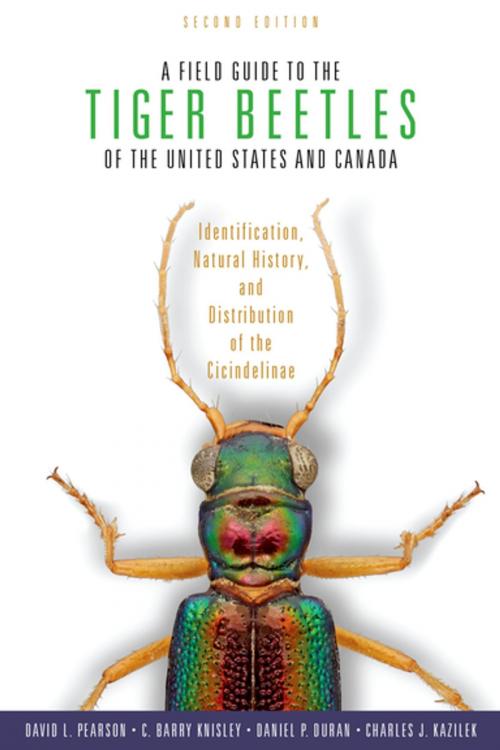A Field Guide to the Tiger Beetles of the United States and Canada
Identification, Natural History, and Distribution of the Cicindelinae
Nonfiction, Science & Nature, Science, Biological Sciences, Entomology, Zoology| Author: | David L. Pearson, C. Barry Knisley, Daniel P. Duran, Charles J. Kazilek | ISBN: | 9780190229177 |
| Publisher: | Oxford University Press | Publication: | March 10, 2015 |
| Imprint: | Oxford University Press | Language: | English |
| Author: | David L. Pearson, C. Barry Knisley, Daniel P. Duran, Charles J. Kazilek |
| ISBN: | 9780190229177 |
| Publisher: | Oxford University Press |
| Publication: | March 10, 2015 |
| Imprint: | Oxford University Press |
| Language: | English |
More than 2600 species of tiger beetles are found all over the world. In North America there are 116 species of tiger beetle, divided into 153 geographically distinct races. Detailed studies of their natural history, population dynamics, communities, patterns of worldwide species richness, and taxonomy of particular subgroups have produced much information. Tiger beetles are among the most widely investigated groups of insects, especially in terms of their ecology and geographic distribution. The first edition of A Field Guide to the Tiger Beetles of the United States and Canada, published in 2005, has served as a field and natural-history guide to all known species of tiger beetles found in North America above the Mexican border. The 2nd edition is a pleasant and comprehensible handbook of the identification, distribution, natural history, and habitat details of the 116 species of tiger beetles in North America. The updated handbook provides new information including observations of seasonality, range extensions and biology, a newly developed list of common names, and twenty-five artistically pleasing identification color plates. The second edition of A Field Guide to the Tiger Beetles of the United States and Canada provides essential information to recognize and easily identify tiger beetles for established naturalists and outdoor enthusiasts alike.
More than 2600 species of tiger beetles are found all over the world. In North America there are 116 species of tiger beetle, divided into 153 geographically distinct races. Detailed studies of their natural history, population dynamics, communities, patterns of worldwide species richness, and taxonomy of particular subgroups have produced much information. Tiger beetles are among the most widely investigated groups of insects, especially in terms of their ecology and geographic distribution. The first edition of A Field Guide to the Tiger Beetles of the United States and Canada, published in 2005, has served as a field and natural-history guide to all known species of tiger beetles found in North America above the Mexican border. The 2nd edition is a pleasant and comprehensible handbook of the identification, distribution, natural history, and habitat details of the 116 species of tiger beetles in North America. The updated handbook provides new information including observations of seasonality, range extensions and biology, a newly developed list of common names, and twenty-five artistically pleasing identification color plates. The second edition of A Field Guide to the Tiger Beetles of the United States and Canada provides essential information to recognize and easily identify tiger beetles for established naturalists and outdoor enthusiasts alike.















